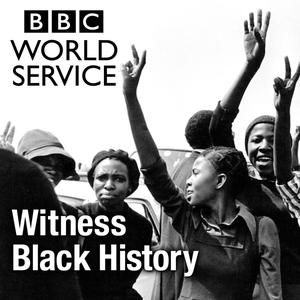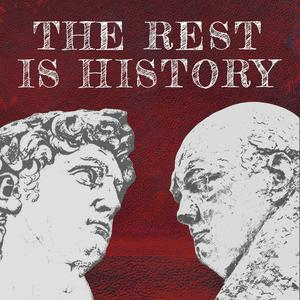
Witness History: Black history
BBC
Listen to and download our programmes
- 10 minutes 13 secondsThe Battle of Versailles: Catwalk clash of American and French fashion
In 1973, a fashion show was held in France which became known as the Battle of Versailles, a duel between designs from modern America and the capital of couture, Paris.
Five American designers, including Oscar de la Renta and Halston, were invited to show their work alongside five of France’s biggest names, including Yves Saint Laurent and Hubert de Givenchy.
The aim was to raise money to help restore Versailles, a 17th Century palace built by King Louis XIV, but the media billed it as a competition between the two countries.
By the end, the Americans were declared the winners. The show also highlighted their industry’s racial diversity on an international stage, with 10 women of colour modelling work by US designers. Bethann Hardison, one of the models, talks to Jane Wilkinson about the lasting impact of the astonishing show.
(Photo: Bethann Hardison at Versailles in 1973. Credit: Jean-Luce Hure/Bridgeman Images)
9 February 2024, 10:00 am - 9 minutes 12 secondsHow Rosa Parks took a stand against racism
Rosa Parks was brought up in Alabama during the Jim Crow era, when state laws enforced segregation in practically all aspects of daily life.
Public schools, water fountains, trains and buses all had to have separate facilities for white people and black people.
As a passionate civil rights activist, Rosa was determined to change this.
In December 1955, she was travelling home from the department store where she worked as a seamstress.
When a white passenger boarded the bus, Rosa was told to give up her seat.
Her refusal to do so and subsequent arrest sparked a bus boycott in the city of Montgomery, led by Dr Martin Luther King.
Using BBC interviews with Rosa and Dr King, Vicky Farncombe tells how Rosa’s story changed civil rights history and led to the end of segregation.
This programme includes outdated and offensive language.
(Photo: Rosa Parks sitting on a bus. Credit: Getty Images)
8 February 2024, 10:00 am - 10 minutesLucha Reyes: Peruvian music star
Lucha Reyes was one of Peru’s greatest singers. She was born into poverty in 1936 and fought terrible health problems and racism throughout her life. But it didn’t stop her becoming a star of Peruvian Creole music - a fusion of waltzes, Andean and Afro-Peruvian styles.
In the early 1970s she recorded hits including Regresa and Tu Voz. One of the few black Peruvian celebrities of her era, she was a trailblazer for black women in the country.
Polo Bances played the saxophone in her band, accompanying her on many of her greatest records. He celebrates her life with Ben Henderson.
(Photo: Lucha Reyes. Credit: Javier Ponce Gambirazio)
7 February 2024, 8:00 am - 10 minutesHow a young mother was saved from death by stoning
In March 2002, a young Nigerian Muslim woman was sentenced to death by stoning for adultery and conceiving a child out of wedlock.
Amina Lawal’s case attracted huge international attention and highlighted divisions between the Christian and Muslim regions in the country.
Hauwa Ibrahim, one of the first female lawyers from northern Nigeria, defended Amina and helped her secure an acquittal.
The case would have very personal consequences for Hauwa who went on to adopt Amina’s daughter.
She tells Vicky Farncombe how the ground-breaking case also changed attitudes in Nigeria towards defendants from poor, rural communities.
(Photo: Hauwa Ibrahim (left) with Amina Lawal, Credit: Getty Images)
6 February 2024, 10:00 am - 9 minutes 54 secondsQueen of the 'fro
In May 1986, 16-year-old Charlotte Mensah went to work in the UK’s first luxury Afro-Caribbean hair salon, Splinters.
In London’s glamorous Mayfair, Splinters had earned a world-class reputation and hosted the likes of Diana Ross.
Charlotte says it looked more like a five-star hotel than a salon and that its owner, Winston Isaacs expected no less than perfection from all his staff.
Now a giant of the hair care industry in her own right, Charlotte has become known as the 'Queen of the 'fro'.
She tells Anoushka Mutanda-Dougherty about her roots and how training at the legendary Splinters changed her life.
This programme includes an account of racial bullying.
(Photo: Young Charlotte in the salon. Credit: Charlotte Mensah)
5 February 2024, 10:00 am - 15 minutes 32 secondsThe funeral of Nelson Mandela
On 15 December 2013, South Africa held the funeral of Nelson Mandela who led the struggle in defeating apartheid and became the country’s first black president.
His ancestral home in the village of Qunu in South Africa’s Eastern Cape hosted 60 world leaders including four United States presidents and two UN secretary generals.
It was the first state funeral held by the country.
Nelson Mandela’s eldest child Dr Makaziwe Mandela tells Josephine McDermott how it took eight years to plan and why it makes her proud to remember that day.
(Photo: Candles are lit under a portrait of Nelson Mandela at his funeral service. Credit: Odd Andersen/AFP via Getty Images)
15 December 2023, 10:00 am - 9 minutes 58 secondsThe Bristol bus boycott
Sixty years ago, there was a boycott of local bus services in the English city of Bristol. The bus company had specified that it did not want to employ black bus drivers.
The boycott ended on 28 August 1963 and the campaign helped to bring about Britain's first laws against racial discrimination.
In 2013, Louise Hidalgo heard from Paul Stephenson and Roy Hackett, who died in 2022.
This programme contains some racist language, used at the time.
(Photo: Bus on Park Street in Bristol in the early 1960s. Credit: Fox Photos/Getty Images)
28 August 2023, 9:00 am - 8 minutes 58 secondsThe Empire Windrush arrives
The Empire Windrush docked at Tilbury in England on 22 June 1948 with 802 people on board from the Caribbean.
The former passenger liner's arrival on that misty June day is now regarded as the symbolic starting point of a wave of Caribbean migration between 1948 and 1971 known as the "Windrush generation".
Sam King was one of the passengers.
He describes to Alan Johnston the conditions on board and the concerns people had about finding jobs in England.
In this programme first broadcast in 2011, Sam also talks about what life was like in their adopted country once they arrived.
(Photo: Empire Windrush at Tilbury docks in 1948. Credit: Daily Herald Archive/SSPL/Getty Images)
22 June 2023, 9:00 am - 10 minutes 2 secondsMing Smith makes history at MoMA
In 1979, The Museum of Modern Art, (MoMA) purchased photographs from an African-American woman for the first time in its history.
Ming Smith was famous for capturing her subjects with slow shutter speeds and using oil paints to layer colour onto her black and white photos.
She worked as a model in New York in the 1970s, while pursuing her passion for photography and was friends with Grace Jones.
Ming took a powerful image of Grace performing at the iconic Studio 54 nightclub in 1978 after meeting her at an audition.
Ming was also a backing dancer in Tina Turner’s music video for What’s Love Got to Do with It, where she captured Tina glancing away from the camera, in front of Brooklyn Bridge wearing a leather skirt, denim jacket and patent stilettos with huge spiky hair.
Ming speaks to Reena Stanton-Sharma about graduating with a degree in microbiology, modelling and struggling to make a living, and then becoming a famous photographer with a retrospective at MoMA in 2023.
(Photo: Tina Turner, What’s Love Got to Do with It. Credit: Ming Smith)
16 June 2023, 8:00 am - 8 minutes 58 secondsOctavia E. Butler: Visionary black sci-fi writer
In 1995, Octavia E Butler became the first author to receive a MacArthur “genius” award for science fiction writing.
From a young age she dreamed of writing books, but faced many challenges, including poverty, sexism and racism in the publishing industry.
She died aged 58 in 2006. Alex Collins speaks to her friend and fellow author Nisi Shawl.
(Photo: Octavia E. Butler. Credit: Getty Images)
6 March 2023, 10:00 am - 9 minutes 5 secondsUna Marson and the BBC Caribbean Service
To mark the 90th anniversary of the BBC World Service, we trace the development of the Caribbean Service.
Its beginnings go back to the early 1940s when the BBC’s first black producer, Una Marson was employed.
She created Caribbean Voices, which gave future Nobel laureates such as Derek Walcott their first international platform.
In 1969, one of the UK’s best known newsreaders, Sir Trevor McDonald, left Trinidad to join the BBC Caribbean Service as a producer.
He reflects on its legacy. Produced and presented by Josephine McDermott.
Archive recording of West Indies Calling from 1943, is used courtesy of the Imperial War Museum. Una Marson's poem Black Burden is used courtesy of Peepal Tree Press and the BBC Caribbean Service archive material was provided by the Alma Jordan Library, The University of the West Indies.
(Photo: Sir Trevor McDonald and Una Marson. Credit: BBC)
19 December 2022, 10:00 am - More Episodes? Get the App
Your feedback is valuable to us. Should you encounter any bugs, glitches, lack of functionality or other problems, please email us on [email protected] or join Moon.FM Telegram Group where you can talk directly to the dev team who are happy to answer any queries.
 Dan Snow's History Hit
Dan Snow's History Hit
 Today in Focus
Today in Focus
 The Rest Is History
The Rest Is History
 History Extra podcast
History Extra podcast
 Witness History
Witness History
 The Inquiry
The Inquiry